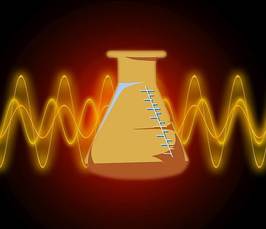DECHEMA-Kolloquium "Forced periodic operation"
DECHEMA-Kolloquium "Forced periodic operation"
- Date: Nov 4, 2020
- Time: 02:30 PM - 06:00 PM (Local Time Germany)
- Location: Virtuell oder Präsenz am Max-Planck-Institut Magdeburg
- Room: Großer Seminarraum "Prigogine"
- Host: DECHEMA und Max-Planck-Institut Magdeburg
- Contact: daniela.verges@dechema.de

Experten aus Industrie und Wissenschaft präsentieren das vielversprechende Konzept der erzwungenen periodischen Betriebsweise von Reaktions- und Trennprozessen und diskutieren, wie dieses neue Konzept der Prozessführung weiter genutzt werden kann.
*************
Continuously operated chemical reactions are not always at their best when in steady state; in fact, some benefit remarkably from forced periodic operation. At this DECHEMA Colloquium, experts from academia and industry showcase the promising concept of forced periodic operation of reaction and separation processes and discuss how it can be further exploited.
Most continuously carried out reaction and separation processes are
operated under steady state conditions. This is due to robustness and
simplicity of operation. But, due to process nonlinearity, the average
performance in a periodic process can exceed that of the optimal
steady-state operation. However, the decision when to aim for what is
not easy. Investing in higher process complexity without the possibility
to predict whether the outcome will be worth the additional effort has
hampered the implementation of this concept in reaction engineering.
Recently, remarkable progress has been achieved in the development of
straightforward and simple to apply prediction methods based on applying
the concept of nonlinear frequency analysis.
Recently, equipment
and control systems for periodic processes have also become more widely
available. Furthermore, numerous processes that can only work in a
periodic regime are nowadays applied successfully in industry. An
example are separation processes exploiting adsorption principles.
Programm
Die Teilnahme an der Veranstaltung kann sowohl per Zuschaltung online als auch mit Präsenz (max. 30 Teilnehmer im Seminarraum) erfolgen.
Die Veranstaltung findet in englischer Sprache statt.
Start: 14.30 Uhr/ Ende gegen 18.00 Uhr
Gastgeber: Prof. Dr.-Ing- Andreas Seidel-Morgenstern
14:30 Welcome and Introduction
A. Seidel-Morgenstern, University and Max-Planck-Institute, Magdeburg/D
14:45 Nonlinear Frequency Response Analysis as a Tool for Evaluating, Developing and Optimizing Forced Periodic Operations
M. Petkovska, University of Belgrade/SB
15:25 The Dynamics of Pressure Swing Adsorption
M. Stegmaier, Linde AG, München/D
16:05 Coffee break
16:30 Forced Periodic Operation of Chemical Reactors: The Interplay between Academic Research and Industrial Practice
G. Kolios, BASF SE, Ludwigshafen/D
17:10 Optimization of Forced Periodic Operation of Chemical Processes
17:50 Discussion
Hier kostenlos anmelden
(Stand: 31. Juli 2020, Programmänderungen vorbehalten)
Bitte haben Sie Verständnis, dass die Präsentationen nach der Veranstaltung nicht zur Verfügung gestellt werden können.
Bildquelle: DECHEMA e.V.